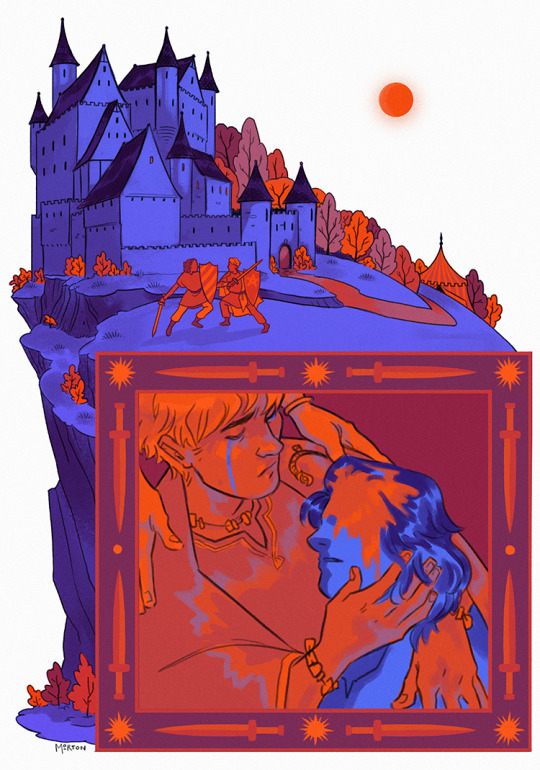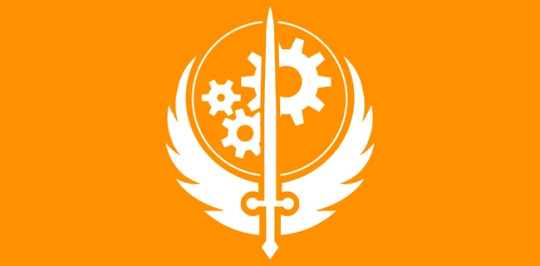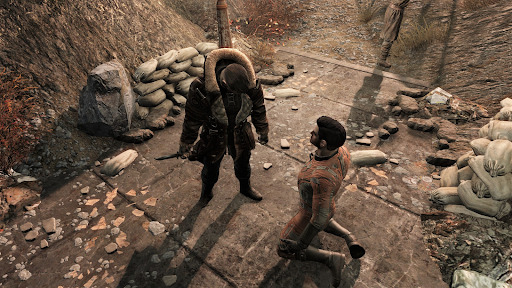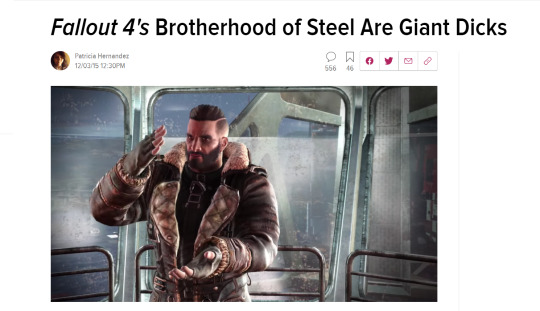Text

Now that I have seen your death, I no longer wish to live, except until I have taken revenge on the traitor who did this to you.
march to camelot prompt #6: grudge
#march to camelot#arthurian legend#gawain#lancelot#arthuriana#illustrators on tumblr#turns out this quote was actually about gaheris but in my head for ages i've been thinking it was about gareth :')#regardless#yes of course i did gawain vs lancelot for this one#anyway yessss finally finished this one#it actually didn't take too long once i just sat down and worked on it properly
366 notes
·
View notes
Text
“What is this, the Dark Ages?”
Or, Arthurian themes and allusions in the Brotherhood of Steel mythos as seen in Fallout 4. (But that’s a lot of words.)

Yep. We're doing this.
First, some obligatory caveats: there is no single Arthurian canon, just 1500 years of assorted fanfic based on the whims of whoever was writing at the time. For this extremely highbrow Tumblr meta, I have ignored most of it and drawn on my favorites. Also Wikipedia.
Also, I am not an expert in Arthurian literature (or Fallout lore, come to that), and I preemptively beg the pardon of anyone who is.
Finally, in no way am I claiming that all these parallels and thematic echoes are deliberate or even significant. In fact, I'd break it down into:
Clearly deliberate allusions, whether in or out of universe;
Probably coincidence, but could be someone deliberately capitalizing on a coincidental similarity;
Almost certainly coincidence, but fun to speculate about; annnnd
Blatant Monty Python references. (Because of course there are.)
I'll start with the big one.
Arthur Maxson, boy king and unifier

(source)
So across all the retellings and variations of King Arthur’s life story, there are a few consistent elements, particularly in his early life and rise to power. Some of these threads are echoed in the Fallout universe, specifically (and unsurprisingly) in the person of Arthur Maxson.
Both the legendary King Arthur and Arthur Maxson were born with a claim to power lying in their ancestry, both were fostered away from their families, and both proved themselves in combat at a young age.
King Arthur united the warring kingdoms of Britain into a single entity, making them stronger against outsiders and receiving general admiration and acclaim. Arthur Maxson united the divided factions of the BoS after the events of Fallout 3 and is held in similarly high regard by his men.
The name Prydwen is a reference to the ship of the original King Arthur. Presumably, Arthur Maxson (or someone in the BoS who anticipated his promotion) christened the airship in a deliberate homage to the Arthurian myth.
King Arthur is associated with his legendary sword. I think it’s notable that Maxson’s legend is associated with a bladed weapon, too. ("He killed a DEATHCLAW with a COMBAT KNIFE!”)
Probably coincidence, but fun: the historical emperor Magnus Maximus, who pops up a lot in early Arthurian legend, was known in Welsh as... Macsen. (⌐■_■)
Round Table, but make it dieselpunk

(Continued under the cut.)
Moving away from obvious allusions and into some looser parallels:
Like the Round Table, the Brotherhood is an exclusive knightly order with its leader being the one able to open it up to his chosen few.
Like the Round Table, the BoS sees itself as defending human civilization against forces of chaos. (I’ll touch on their tech-hoarding tendencies when I get to the Grail stuff.) This idea of civilization in the face of chaos goes back to the BoS’s founding, even though the level of isolationism we see in most of the Fallout franchise is not exactly what founder Roger Maxson had in mind: “Notably, Maxson's ultimate intention was to establish the Brotherhood as an organization that works closely with people outside of the Brotherhood, as guardians of civilizations, not its gatekeepers.” (source) In a lot of ways, Arthur Maxson represents a return to his ancestor’s original ideals.
Renegade knights? Internal politics? Traitors within? We gotchu.
In both the medieval legends and in all chapters of the BoS we’ve seen, there’s a big focus on bloodlines (ew). Ironically, it’s probably Arthur Maxson’s unquestionable ancestry that allows him to be more progressive than either of his East Coast predecessors when it comes to boosting Brotherhood numbers by recruitment (even though you can still see a clear division between “born Brotherhood” and recruited soldiers, but that’s a topic for another day). Maxson sees himself as an Elder who "cares for the people"—however misguided and patronizing that attitude might be—and whatever else you might say about the guy, you can't say he doesn't believe he has a duty. Which brings us to…
Know Your Enemy: Danse as Gawain
Before I start this section, an acknowledgement of authorial bias:
Gawain, as portrayed in the Middle English poem Sir Gawain and the Green Knight, is my very favorite of King Arthur’s knights. (Other stories aren't always as flattering, but like I said at the outset: I'm sticking to the ones I like.)
That poem is my very favorite piece of medieval Arthurian literature. In this section, I'll refer to the modern English translation by Simon Armitage.
...that’s it, I have no other biases to disclose.
What? 👀

(Art: Clive Hicks-Jenkins)
All right. So in Sir Gawain and the Green Knight, you’ve got this himbo loyal knight of Arthur’s who finds himself caught up in... you know what, let me just paste in the Wikipedia summary. (The Toast, RIP, also did a pretty entertaining and more-or-less accurate recap.)
It describes how Sir Gawain, a knight of King Arthur's Round Table, accepts a challenge from a mysterious "Green Knight" who dares any knight to strike him with his axe if he will take a return blow in a year and a day. Gawain accepts and beheads him with his blow, at which the Green Knight stands up, picks up his head and reminds Gawain of the appointed time. In his struggles to keep his bargain, Gawain demonstrates chivalry and loyalty until his honour is called into question by a test involving the lord and the lady of the castle where he is a guest.
Don’t worry too much about the plot details, though; for this post, I’m more interested in the thematic parallels. The Green Knight story is full of contrasts: order vs. chaos, civilization vs. wilderness, mortal man vs. Other... but let’s start with Gawain himself.
Some stuff to know about Gawain:
He was "as good as the purest gold, devoid of vices but virtuous and loyal". Gawain took his principles more seriously even than the rest of Arthur’s knights, not out of pride but out of humility: "I would rather drop dead than default from duty," he says.
He’s faithful and honorable and never even tempted to betray an oath, even when offered every variety of seduction and riches, except for a single moment of weakness in a desperate desire not to be executed for random shit by powerful forces for reasons he doesn't understand.
Even though he doesn’t really understand why he needs to die, he sticks to his oath. Gawain's one weakness is a moment of desperate, private, human desire for survival. He'll submit to the headsman’s axe if he has to, but he'd still rather live.
Above all, Gawain is the ideal of a human man: he might be the bravest and loyal man there is, but he’s still fundamentally human.
You can probably see where I'm going with this.

A few more fun facts about Gawain that resonate with Paladin Danse’s story:
He’s got a bunch of really shitty brothers. (No comment.)
Gawain (SPOILERS!) doesn't actually end up beheaded, but he does willingly kneel for his execution and gets a cut on the throat as a reminder of his sin. And, uh, Danse can also get his throat cut! It doesn’t end as nicely but it’s, you know, a thing that can happen.
Gawain might be a really good guy, and he tries really hard to be one, but in the end he’s nothing more than that: there’s nothing supernatural about him, he has no special powers beyond his own principles and devotion. He’s just a dude doing his Best.
Wait, why not Danselot?
Oh, that guy? Here’s the thing.
Lancelot personifies the continental ideals of courtly love that became popular in the High Middle Ages. Central to his story is the prioritization of personal relationships and romantic feelings in a way that you don’t really see in Gawain's, at least in the Green Knight tale. (Later stories hook Gawain up with an extremely delightful lady, but even that is a different flavor of romance than Lancelot's and has more to do with Gawain honoring his word and his egalitarian treatment of women (hell yeah). In the poem, Gawain is impressed by Bertilak's wife but resists her temptation; in fact, the biggest risk is not that he'll yield to her advances but that he'll be discourteous to her, i.e., violate his principles and cause dishonor to his king and his host.)
Lancelot is driven by passions over principles in a way that Gawain never really is (at least in the stories I’m talking about; later writers have committed character assassination to various degrees). Yes, you could argue that both Gawain and Lancelot betray their oaths, but Lancelot’s betrayal is never, um, blind. He knows what he’s doing and makes a deliberate choice to prioritize his love for the queen over his love for the king. It doesn’t make him a bad guy—he too is an ideal knight with one fatal flaw—but his character isn’t as comparable to Paladin Danse.
Yeah, Gawain is (in most stories) a prince and a kinsman of Arthur’s, but he’s ultimately a native boy who doesn’t break the mold of a Knight of the Round Table. Likewise, Danse is portrayed as competent and valuable to the BoS, but not exceptional or breaking the mold of what a BoS soldier should be: he simply represents the ideal. Meanwhile, Lancelot is a foreign prince who was marked from childhood as special and fancy, and his storyline goes alllll over the place. (Much like this post.)
For example, Lancelot goes to absolutely absurd extremes to prove his devotion for no other reason than to prove it. (��I’ll do any useless humiliating thing you want. I’ll betray every oath except the one I made to you. That’s what love is!”) Gawain would never. Danse would never.
Ultimately, Gawain's tests are of his character and not of his love. And like Gawain, Danse’s devotion is to service and his principles, not to another person—even Arthur Maxson.
All that said, there are some similarities: both are beloved by Arthur, both are held up as the ideal of what a knight should be. And even if their fatal flaws are different, both make the point that no matter how good and brave and loyal they might be, no human being can be perfect.
(Except Galahad. Who is, as a result, very boring.)
I’ll conclude this section with a quote from someone else’s take on the Greek Knight poem:
I like Gawain. He’s not perfect, but he’s trying his best which is all any of us can do. He’s not like the other knights in the Arthurian legends who occasionally ‘accidentally’ kill women on their little adventures and then feel hard done by when they have to deal with the consequences of that. Gawain holds himself to a high standard – higher, it seems, than Arthur and his knights hold him to considering how hard they laugh when Gawain tells them how bad he feels about the whole thing.
I think Gawain is very relatable in this story. We all want to be better than we actually are.
And that, more than anything else, is Danse.
The Grail myth
What’s that? Lost relics of power? Better send some large armed men after ‘em!
The parallels to the BoS’s tech-hoarding ways are obvious enough that the games themselves lampshade them (albeit by way of Monty Python). But it also ties into the larger themes of “purity” versus “corruption” and the BoS’s self-image as a bastion between civilization and chaos. (See Maxson's line in response to the Sole Survivor’s quip about the Dark Ages: “Judging from the state of the world, it wouldn't be a stretch to say we're living in that era again.”)
But the ultimate futility of the Grail mission is also worthy of note. The BoS might want the power of prewar tech on their side, but they’re no more to be trusted with it than any other group of human beings. No matter how they try, the “corruption” of humanity can’t be overcome as long as they’re striving to harness power for their own ends. You can only achieve power by surrendering control of it.
The death of Arthur
The nature of gameplay being what it is, it's not guaranteed that the Arthur figure will be fatally betrayed, bringing Camelot down with him—but it's not unlikely, either.

Awkward.
Some final spitballing:
Outside the Brotherhood, there are some fun parallels of the Arthur myth with the rest of Fallout 4. Betrayal by one’s own son, for example.
The key difference between the BoS and the legendary Round Table: King Arthur’s knights, for all their flaws and human weaknesses, are usually presented as unambiguous Good Guys. The BoS is... a little more ambiguous...

...but damn if they don’t think they're the good guys.
A-ad victoriam, fellas!
#fallout#fallout 4#brotherhood of steel#arthur maxson#paladin danse#sir gawain and the green knight#sir gawain#gawain#knights of the round table#king arthur#elder maxson#fallout 3#fallout lore#maxson#roger maxson#look mom I did a meta
324 notes
·
View notes
Text
Actually, List of British Servant Vs Cooking Skill:
The Arturias: Nope, never learned and never needed to. That’s honestly it, their lack of cooking isn’t anything funny, they could probably learn to if they wanted.
Gawain: Oh fuck no he can’t! This is actually canon, he’s a one note chef and that note is Bad™
Lancelot: Yes but only to impress the ladies and get laid, and ever then it’s only vaguely decent. Also the cooking isn’t that great.
Tristan: Honestly? Better than the other Knights (except Bedivere) I honestly believe this. I honestly believe Tristan is allowed in the kitchen because he is not a total fuck up somehow.
Bedivere: Like everything in comparison to the Knights, Bedivere is Good But Not The Best. At least, in theory, but Bedivere is Good in a sea of “Banned From The Kitchen” Types, so by comparison Bedivere is a cooking god. Also Bedivere is Good Boy so he can improve unlike most everyone else on this list.
Galahad: Unfortunately yes, Mr Perfect learned to cook because of fucking course he did.
Mordred: Oh he’d try, bless his heart he’d try! But no, this kid cannot cook. Much to the disappointment of Fran.
Agravain: His grease just gets into everything he cooks, ruins everything. Also he’d be the type to make health food exclusively probably.
Gareth: ...Look let’s just say at this point none of the Orkney siblings can cook, though Gareth would mess up the least.
Waver: ...You really think this disaster of a man can cook?
Gray: Hey someone in Wavers entourage has to, and like many things that falls to Gray.
Reines: No Reines, Trimmau cooking does not count as you cooking.
Boudica: Yes and this is canon, however she’s really Iceni so she’s only British on a technicality.
Merlin and Proto Merlin: You look me in the eyes and say you truly believe, in you heart of hearts, that the literal Internet Wizards can cook and cook well. Yeah that’s what I thought.
Astolfo: Ok look I know they’re a French literary character but they’re English in the story so they count. Anyways answer is no but unlike most other noes here they’re not a colossal cooking fuck up they just need a minor amount of work. Like, edible but not preferable.
Moriarty: Honestly? Yes, I do think Moriarty could cook, man is clearly a Man of Wealth And Taste, if nothing else he makes a mean cocktail and I know that doesn’t necessarily translate to cooking but I just Know he can make something serviceable. If nothing else he’s smart enough to know how to not fuck up!
Sherlock: No. Sherlock hides it well enough but this is a slight disaster man and sadly he cannot cook despite his intellect. ...Unless a case requires him to, in which case nothing will taste better. He will figure out gramgram’s secret apple pie recipe for that case and replicate it perfectly and you will be in awe.
Robin Hood: Man lived on his own in Sherwood he probably knows more about how to perfectly roast meat over a fire than anyone else in the world, among other open fire recipes. Also he would actually listen to constructive criticism, a bonus in his favor!
Francis Drake: Actually, I bet she could and would, and she’d do it with stolen spices (not too many though, she needs those to make money with!) In all seriousness, she’s a pirate, at the very least she likely knows how to make things edible if she gets stuck somewhere.
Charles Babbage: Modern English Servant, enough said.
Nursery Rhyme: Not counting her as she’s a child based on fairy tales, and is only English by technicality.
Shakespear: Even if he could, he wouldn’t because he’d enjoy seeing you try to stomach the tragedy that is this meal.
Jack the Ripper: Uh, no, I do not think the aggregation of dead children who never had mothers know how to cook.
Florence Nightingale: Cooking food keeps you from getting sick.
391 notes
·
View notes